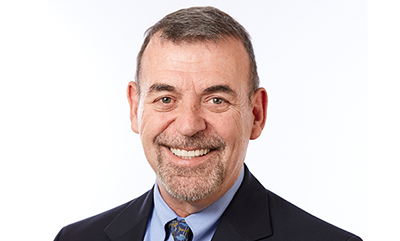Faculty Spotlight: Daniel Merrigan.
Collaborative work is key to developing sustainable public health solutions and improving population health outcomes. This weekly series spotlights one SPH faculty member who advances public health through collaborations within the field and across sectors.
 Can you talk about some of the meaningful collaborative work that you’ve done in your career?
Can you talk about some of the meaningful collaborative work that you’ve done in your career?
Much of my applied scholarship requires community-based boundary spanning interprofessional collaboration to address the health and wellbeing of court-involved youth with substance misuse and other co-occurring mental challenges. Most have included collaboration with SPH colleagues and opportunities for student practicum placements.
One such initiative, Reclaiming Futures, supported by the Robert Wood Johnson Foundation, involves working with coalitions of local juvenile justice systems (juvenile court judges and juvenile probation leaders), adolescent alcohol and drug treatment (and related mental health) providers, education and community leaders representing the youth development and engagement sector as well as other civic leaders, to blueprint a new method of identifying and addressing the challenge of substance use and the need for a better recovery-centered transition environment following justice and treatment involvement.
Reclaiming Futures is not a program—rather, it is an organizational change and system reform that organizes services and opportunities to increase collaboration, coordination, and effectiveness while strategically addressing widespread fragmentation and lack of coverage of essential services. The overall goal of the effort is to boost the capacity for juvenile justice and other systems that serve youth beyond the original 10 pilot sites and disseminate a new type of national standard of care as it relates to this issue. In the more than 40 Reclaiming Futures communities, judges now work with local leaders to reframe the way law enforcement, courts, probation, healthcare providers, faith communities, schools, business and the community cooperate to help troubled young people succeed.
How are collaborative partnerships particularly vital for public health work at the community level?
Issues that impact population health are by their very nature complex. Like juvenile justice reform, other public health challenges, Covid-19, climate change, educational disparities, etc., remain seemingly intractable due to many constraints that surround any specific program or capacities that individuals or organizations may have. Addressing the many systemic forces at play requires collaborative interprofessional and cross-sector partnerships to recognize and collectively mitigate conditions that inhibit needed change. Collaborative partnerships often enable movement beyond predetermined solutions and illuminate potential innovations and resources that more individual or insular organizational efforts miss.
What are the skills of a great collaborator?
I’ve observed that meaningful collaboration and innovation are more likely to occur when efforts are made to establish trusting relationships and honest communication among stakeholders. Many attributes associated with effective leadership matter. Reflection, mindfulness, personal humility and self-awareness of one’s own style preferences, social identity(s), privilege, implicit biases and emotions can contribute to the ability to engage and handle interpersonal relationships judiciously and empathetically. Other helpful skills include the ability to assess the environment (big-picture thinking), create clarity with vision, strategy, and benchmark indicators, share power and support others’ development.
“Dan is caring and supportive of students and faculty alike. He is also understated, and doesn’t toot his own horn enough. The main thing with Dan is you want him around when hard things happen. When you need him, he is there, and helpful.”
Richard Saitz, chair of the Department of Community Health Sciences